The Little Mermaid - She's gotta have it!
 Sunday, November 17, 2019 at 12:18PM
Sunday, November 17, 2019 at 12:18PM For the 30th anniversary of The Little Mermaid I wanted to reshare this piece I wrote about the movie ages ago. Still one of my favourite essays - Nathaniel R
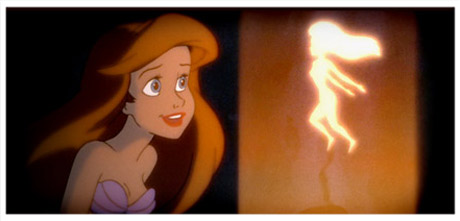
American members of Generation Y or Z and beyond may have a good deal of trouble imagining this but it's true: once upon a time, animated movies were considered highly uncool. They were strictly for babies. Teenagers disdained them. Adults took their children under duress. They barely caused a ripple at the box office. The Academy of Motion Pictures Arts and Sciences ignored them. CGI was not part of the national vernacular. Strange but true.
In a very short window of time, from November 1989 through February 1992, three major events changed modern perceptions of the animated film in a gargantuan way. Let's take them in reverse order: The third big-bang was the moment when Beauty & the Beast (1991) was nominated for six Oscars including Best Picture, the first time that a cartoon had received that pinnacle mainstream honor. The middle part of the three-part revolution was when hipster American audiences began to discover that there was more to the form than Walt Disney. Katsuhiro Ôtomo's Japanese sci-fi spellbinder Akira was the key that opened the door for anime, now very big and influential business in America. But the first key event in animation's rebirth (stateside at least) was the release of Disney's "28th animated classic" The Little Mermaid; an orgasmic reawakening of the most flexible and fantastical of film mediums...
"She's Gotta Have It!"
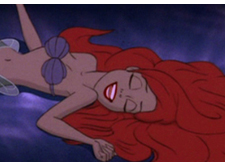 The heroine of Disney's modern breakthrough film is Ariel, a teenage mermaid. Since this is a fairy tale (and a Disney one at that) she's also a beautiful princess: the youngest daughter of King Triton who rules the ocean. Only trouble is, despite her quick smile and high spirits, she's restless and unhappy... dissatisfied with her life of privilege under the sea. She wants to trade up. Literally. Since this is a late 1980s film (and a Disney one at that) she's also the headstrong entitled type. This princess isn't going to whisper her need. She's no Oliver with his meager allotment of gruel, politely asking for more.
The heroine of Disney's modern breakthrough film is Ariel, a teenage mermaid. Since this is a fairy tale (and a Disney one at that) she's also a beautiful princess: the youngest daughter of King Triton who rules the ocean. Only trouble is, despite her quick smile and high spirits, she's restless and unhappy... dissatisfied with her life of privilege under the sea. She wants to trade up. Literally. Since this is a late 1980s film (and a Disney one at that) she's also the headstrong entitled type. This princess isn't going to whisper her need. She's no Oliver with his meager allotment of gruel, politely asking for more.
Ariel belts out her desires in a power ballad "Part of Your World". This is what she wants. She's gonna go get it. She's gotta have it.
When's it my turn?
Wouldn't I love, love to explore that shore up above?
Out of the sea
Wish I could be
Part of that world.
This power ballad, economically placed in the film's first fifteen minutes (the animated film is still nimble and fast in 1989, free of the current CG bloat which must be attributed at least partially to the the need for adaptable video game levels), sets the plot in motion. Ariel will fall in love with Prince Eric, a human. She will make a dark deal with Ursula the Sea Witch, trading her voice for human form to pursue true love's kiss. Since this is a Disney film first and a fairy tale second, Ariel will live happily ever after. She will not end up losing the prince and transforming into sea foam, lost in the waves forever -- Disney being a more benevolent god than Hans Christian Andersen.
Over the years there's been much fuss made over the sexism in Disney's oeuvre and fairy tales in general, particularly princess tales. These stories do hinge heavily on the old school Snow White p.o.v. "someday my prince will come" and the eternal happy ending that that promises. But The Little Mermaid isn't as easy a read on this point as its most vocal critics would argue. She's slippery when wet. Yes, Ariel's willing to give it all up for a man but she's also the one rescuing him (twice in point of fact). Yes, she wants to marry a prince but she's also already a princess (it's a lateral move). Yes, she snaps up the sea witch's regressive deal, choosing looks and beauty at the expense of her voice as a 'bright young woman', but it's worth noting that this magical tradeoff is viewed as a wicked con game. We know this mermaid will need her voice even if she doesn't yet understand its value. Then again... even the value of her voice is connected to its ability to snag the prince, so perhaps The Little Mermaid is an entirely sexist fable after all.
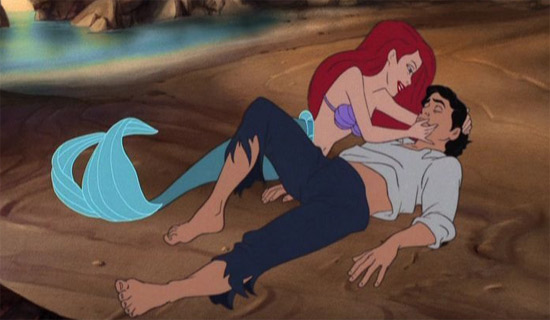
We can't exactly claim Ariel as a feminist icon but it's still fascinating how easy she is to place within the greater pop culture timeline of post-Madonna feminism. She's the first edition of the huge "girlpower" movement that ruled the 1990s (The Spice Girls, The Powerpuff Girls, Tori Amos, Madonna's "Blonde Ambition", Buffy the Vampire Slayer, Lilith Fair, and a million others) but also, if you'll allow for some speculative overreaching, a predictor of how shallow the progress would be, with a quick regression back to women as sexual objects foremost: overt sexuality is no longer about the woman pleasing herself (Madonna) but about her ability to please men (Britney Spears).
At any rate, gender politics aside, it's easier and more appropriate to read The Little Mermaid as a hormonally addled sexual awakening fable. Ariel does writhe around ecstatically in a bikini but the pleasure she's imaging is inchoate. She (and Disney) is just growing up. It's worth noting that this signature song is not initially about a man. She will meet Prince Eric in the next scene and he will give shape to her longing. The song gains its true title "Part of Your World" [italices mine -ed] only in reprise, after Ariel rescues Eric from drowning. She caresses his face and sings it to him, her desire now tangible. To have him, to grow up, she must become human. This becomes her goal but it's also a frightening journey. The moment her wish is granted is telling, played as it is for sheer terror with thunderbolt flashes of light, her fin splitting --legs opening. What has this young girl done?! As her aquatic friends race her nude human form to the surface, she emerges in slow motion silhouette: back arched, breasts forward, head flung back, with the full orchestra swelling. She's not Daddy's little girl anymore.
The Little Mermaid is at once innocent and racy. And, though its romance and technical achievements are more juvenile than the modern masterpiece Beauty & The Beast and the undervalued Pocahontas, it is arguably the closest the fabled studio ever came to presenting truly adult content...
"Deep Throat"
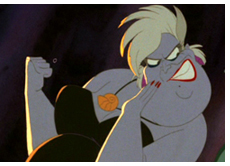 But how about something for all ages: The Little Mermaid's Oscar winning score. Ariel's power ballad may already be stuck in your head while reading this but it's just one of several gems in the clever, impressive song score by composer Alan Menken and lyricist Howard Ashman. The Little Mermaid is justly credited with reviving interest in the animated film but it's less often mentioned in discussions of the rebirth of the musical and there it also proved pivotal. In the dark ages of the movie musical (that'd be the 1980s) nearly every live action musical failed financially and artistically. Disney released only five animated films (The Fox and the Hound, The Black Cauldron, The Great Mouse Detective, Oliver & Company and The Little Mermaid) in the 80s and only the latter three had musical numbers. Of those three The Little Mermaid is the only true musical, telling its story through songs.
But how about something for all ages: The Little Mermaid's Oscar winning score. Ariel's power ballad may already be stuck in your head while reading this but it's just one of several gems in the clever, impressive song score by composer Alan Menken and lyricist Howard Ashman. The Little Mermaid is justly credited with reviving interest in the animated film but it's less often mentioned in discussions of the rebirth of the musical and there it also proved pivotal. In the dark ages of the movie musical (that'd be the 1980s) nearly every live action musical failed financially and artistically. Disney released only five animated films (The Fox and the Hound, The Black Cauldron, The Great Mouse Detective, Oliver & Company and The Little Mermaid) in the 80s and only the latter three had musical numbers. Of those three The Little Mermaid is the only true musical, telling its story through songs.
While the score is of considerable quality, a great deal of its enduring entertainment value comes from the rich vocal work of its cast. They all do smartly succinct character work while also ably serving the songs. Pat Caroll thrills as Ursula, the sea witch (a subject deserving of another article entirely) and Jodi Benson nails the lead role with her clear youthful soprano, a perfect match for Ariel who, if I may reference Britney Spears again, is 'not a girl, not yet a woman.'
"Carnal Knowledge"
All of these awakenings: musical. sexual, animated. Yet The Little Mermaid represents something of a death, too, being arguably the last of its kind. It wasn't free of computer enhanced moments but they're largely invisible. The CG invasion becomes crystal clear in the very next film (Beauty & The Beast) and begins a full scale invasion of the medium from then on. Disney would never look back and now, seventeen years later, the hand drawn animated film is a rarity in the US, a relic. I personally miss the drawings. I miss thinking of the animators huddled around their drawing tables, working out the performances. I know that this same creative process happens around computers today but it doesn't carry the same emotional charge in the minds eye --perhaps it's too easy to imagine that they're all accountants looking at an excel spreadsheet?
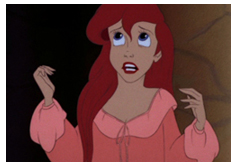 There's a great blink-and-you'll-miss-it "acting" moment late in this lovely film that I always look forward to. Ariel has woken up from peaceful slumber after a thrilling date with the Prince. She races out of her bedroom only to discover that the Prince has becomes betrothed to another (Ursula in disguise). Ariel darts behind a pillar to avoid being seen and we watch her mind race to process this crushing impossible development. Her face fills with grief and her right hand twitches back and forth. It's a heartbreaking fragile little gesture and it sticks in my throat every time I watch the movie. So young to have loved and lost.
There's a great blink-and-you'll-miss-it "acting" moment late in this lovely film that I always look forward to. Ariel has woken up from peaceful slumber after a thrilling date with the Prince. She races out of her bedroom only to discover that the Prince has becomes betrothed to another (Ursula in disguise). Ariel darts behind a pillar to avoid being seen and we watch her mind race to process this crushing impossible development. Her face fills with grief and her right hand twitches back and forth. It's a heartbreaking fragile little gesture and it sticks in my throat every time I watch the movie. So young to have loved and lost.
This tender moment of panic has multiplied in meaning for me. It still works beautifully to set up the emotional stakes for the film's climax. But now there are additional parallel thoughts vying with those huddling artists for my time. In the screening room of my mind it's now the hand drawing (Ariel) noticing the computer image (Ursula) threatening to steal the movies (Prince Eric) away. It's also me (Ariel) all grown up seeing Disney (Ursula) tarnishing my childhood memories (Prince Eric) by shamelessly pimping their own classics in countless straight to video "sequels" --just one of a thousand ways in which they dismantle their good name to chase the almighty dollar.
The Little Mermaid can still make my heart soar like it was 1989 all over again. I'll give it that. It's just hard to love it in the same pure way. Ariel lost her innocence and I lost mine, too.




Reader Comments (14)
“Part of Your World” will always be my all-time favorite Disney ballad. Really, Disney song, period. Ashman was a gifted lyricist, and Menken remains a genius melody-maker, but they never, whether alone or together or with others, captured the essence of Disney in three minutes and thirty seconds. “When You Wish Upon a Star” comes so close, but it’s missing Jodi Benson’s air-light vocals, and her immortal delivery of that final verse as she sinks back into her grotto...
As I get older, it only becomes more special, and of course, the easier it is for me to get (no pun intended) swept up in it. I’m a mess every time.
Ashman’s demo is a joy to listen to, and also, of course, incredibly sad.
Oops, I meant to say they never captured the essence of Disney as well as they did with “Part of Your World.” :)
Thank you for sharing this wonderful essay Nathaniel. This film still holds my heart as it did when I first saw it in the cinema aged 7. Part of Your World is my all time favourite film song and makes my heart soar like no other - Howard Ashman left a beautiful legacy
Completely love the Kiss The Girl song & sequence.
The journey of Part of Your World to enduring classic Disney is quite a tale. Originally tagged to be left on the cutting room floor due to misconceptions that the tune would bore children, Ashman and Menken fought to retain the power ballad by arguing the "I Want" number is an essential compenent of a Broadway score.
In 1989 the Oscars, Grammys and Golden Globes all featured their prizes on the Calypso influenced numbers, Under the Sea and Kiss the Girl. Part of Your World received no recognition then. Only with time has the depth and artistry, beautifully articulated in Nathaniel's post, come to the forefront.
Hans Christian Andersen's original tale is probably the saddest, most heartbreaking and cruel thing ever written for children and of an unique poetic beauty. About the animation, it's a shame that Disney no longer does this kind of 2-d feature film animation, it's really pitiful.
A classic animation masterpiece
Fantastic essay Nathaniel!
This movie still holds a very special place in my heart as it was the first one I saw in a theater (at age 4) and owned on VHS. But besides these nostalgic considerations, it still is my favorite Disney picture and one of my most beloved musicals - not to mention a very early indication of my gayness, as I would spend hours daydreaming about being a mermaid princess.
I second James, it's baffling to notice the lack of recognition Part of Your World received from award bodies at the time. Howard Ashman was indeed a very gifted lyricist.
Excellent piece, I loved it!!
Nat: I'd have gone with a more expansive "four big bangs, three of them movies" if I was writing this article. (#4: Beauty and the Beast at the Oscars, February 1992. #3 Akira's American Premiere, December 25, 1989. #2 The Simpsons Series Debut, December 17, 1989. #1, The Little Mermaid, November 1989.) And that statement about adaptable video game levels kinda stings HARD. Video game tie-ins don't really exist anymore. Haven't for almost a decade.
volvagia -- well the article was written a decade ago. so that makes sense.
This was my first Disney movie watch in a theatre. I loved it so much at 6 and 30 years later it hasn't Change one bit. Or actually it became even more, since handdrawn Disney animations are hardly there anymore…
Ursula is also just one of the best Disney villains ever!
I'm certain that assuming you are searching for a task and you are not getting even the principal interview with the business, then, at that point, go now to TopResume Review - they will help you. Here are genuine experts who can create your resume rapidly and productively, and you will promptly see positive outcomes.
This is so awesome
Visit www.blackmermaidshoppe.com for more black Mermaid related items